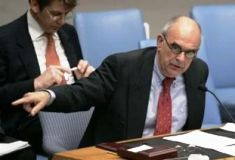Annan still has confidence in UN envoy to Sudan
Oct 23, 2006 (UNITED NATIONS) — Secretary-General Kofi Annan still has full confidence in his top envoy in Sudan who was ordered to leave the country after accusing the army of violating U.N. resolutions by mobilizing Arab militias in Darfur province following heavy losses in recent fighting with rebels, the U.N. spokesman said Monday.
 Jan Pronk, who has been Annan’s special representative in Sudan for over two years, was leaving Khartoum, but U.N. spokesman Stephane Dujarric stressed that he was being recalled for consultations at Annan’s request — and not departing to comply with the government’s order.
Jan Pronk, who has been Annan’s special representative in Sudan for over two years, was leaving Khartoum, but U.N. spokesman Stephane Dujarric stressed that he was being recalled for consultations at Annan’s request — and not departing to comply with the government’s order.
Pronk flew out of Khartoum Monday night and was expected to arrive in New York late Wednesday for meetings with Annan and other senior U.N. officials, U.N. deputy spokesperson Marie Okabe said.
Meanwhile, Annan spoke to Sudanese President Omar al-Bashir on Monday morning, and Assistant Secretary-General for Peacekeeping Hedi Annabi met Sudan’s U.N. ambassador Monday afternoon to discuss the government’s letter to the secretary-general requesting Pronk’s withdrawal, she said.
“What needs to be clearly stated is that he continues to be the special representative of the secretary-general and serving with the full support of the secretary-general in that capacity,” Dujarric said. “We are recalling him back for consultations. As far as we are concerned, his status has not changed.”
Asked whether the secretary-general has full confidence in Pronk, Dujarric replied, “Yes he does.”
Japan’s U.N. Ambassador Kenzo Oshima, the current Security Council president, said the council will wait to hear what the secretary-general has to say. “Depending upon his reaction to it, the Security Council may have to be briefed and consider some possible action if that is necessary,” he told the Associated Press.
The Sudanese government on Sunday gave Pronk three days to leave the country, heightening a dispute between the U.N. and the Khartoum government over peacekeeping in conflict-wracked Darfur province. Sudan has refused to allow U.N. peacekeepers to replace a poorly equipped African Union force that has been unable to halt escalating violence in the vast western region.
The outspoken Pronk, a former Dutch politician and diplomat, leveled the accusation about the Sudanese army in his personal Web blog.
In a posting Oct. 14, Pronk said Sudan’s military had suffered heavy losses in recent fighting with rebels in northern Darfur. “Reports speak about hundreds of casualties in each of the two battles, many wounded soldiers and many taken as prisoner,” he said.
Pronk also said the government was responding to the deteriorating situation “by directing more troops and equipment from elsewhere to the region and by mobilizing Arab militia” which have been accused of horrific atrocities.
“This is a dangerous development,” Pronk said. “Security Council resolutions which forbid armed mobilization are being violated.”
The Sudanese military denounced Pronk’s allegations, branding them “psychological warfare against the Sudanese army.”
On Sunday, the Foreign Ministry ordered Pronk to leave, accusing him in a statement distributed by the official Sudan News Agency of demonstrating “enmity to the Sudanese government and the armed forces” and involvement in unspecified activities “that are incompatible with his mission.”
Dujarric refused to comment on Pronk’s accusations, reiterating Monday that his blog “is his personal web log which I will not comment on.”
He noted that Annan had repeatedly expressed concern “about the military build-up in Darfur” and stood by his statements and monthly reports to the Security Council, which have painted a grim picture of stepped up rape, murder and pillage.
Violence has risen dramatically in recent weeks in Darfur, where more than 200,000 people have been killed and 2.5 million displaced in more than three years of fighting.
Darfur, a largely arid plateau, has been in turmoil since February 2003, when ethnic African tribes rebelled after years of neglect by the Arab-dominated government in Khartoum. The Sudanese government is accused of responding to the uprising by attacking civilians with its own army and backing Arab militias known as the janjaweed believed to be responsible for some of the worst atrocities.
The Security Council passed a resolution in August that authorized the U.N. to take over from the 7,000-strong African Union force, but Sudan’s government vehemently opposes the introduction of U.N. forces in Darfur. The resolution also extended the mandate of the AU force until Dec. 31 and called for the U.N. to help improve its operations.
Dujarric said more than a dozen U.N. police and military advisers have already been dispatched to the AU mission.
“More will be on the way and our plan to strengthen the African Union mission is continuing, and the cooperation of the government of Sudan in the implementation of that plan is also continuing,” he said. “They have been cooperating.”
(AP)
